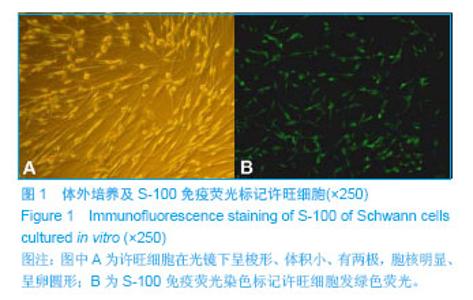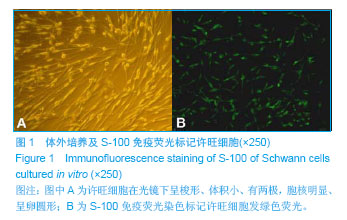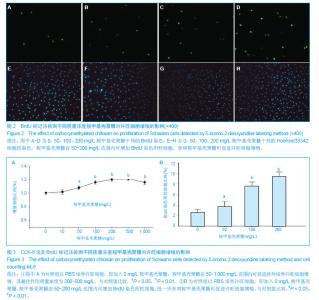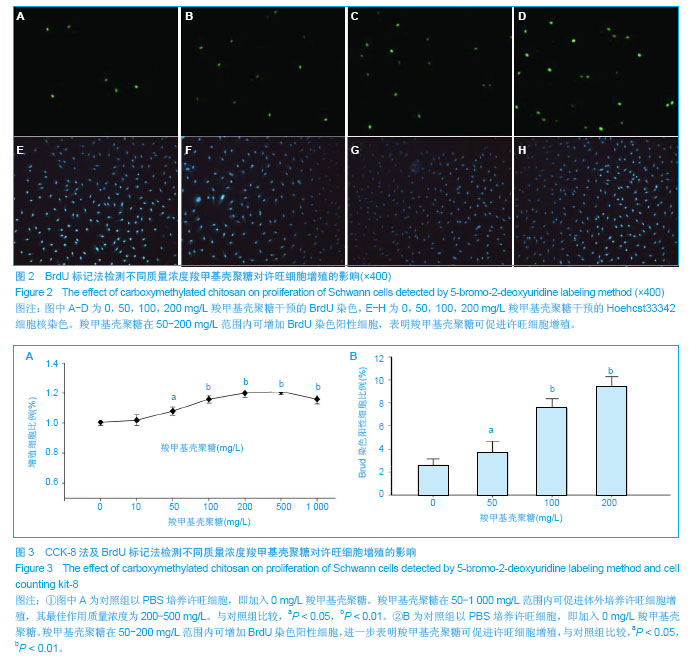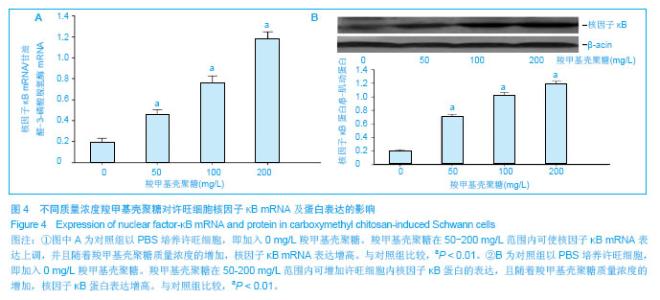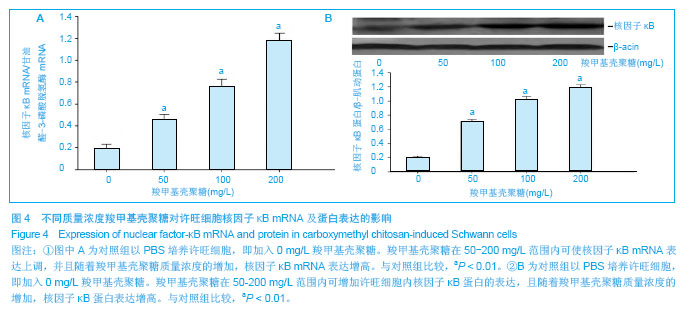| [1]Zorick TS,Lemke G.Schwann cell differentiation.J Curr Opin Cell Biol.1996; 8(6):870-876.[2]Bergey PD,Axel L.Focal hypertrophic cardiomyopathy simulating a mass: MR tagging for correct diagnosis.AJR Am J Roentgenol.2000;174(1):242-244.[3]Campana WM.Schwann cells: activated peripheral glia and their role in neuropathic pain.Brain Behav Immun.2007;21(5): 522-527.[4]Lavdas AA,Papastefanaki F,Thomaidou D,et al.Schwann cell transplantation for CNS repair.Curr Med Chem.2008;15(2): 151-160.[5]Chernousov MA,Yu WM,Chen ZL,et al.Regulation of Schwann cell function by the extracellular matrix.Glia. 2008; 56(14):1498-1507.[6]贺斌,刘世清,李皓桓.吡咯喹啉醌对雪旺细胞增殖及NF-κB表达的影响[J].中国矫形外科杂志,2009,17(21):1647-1650.[7]贺斌,刘世清,李皓桓.吡咯喹啉醌对大鼠雪旺细胞形态及增殖细胞核抗原表达的影响[J].武汉大学学报:医学版,2010,31(2): 141-144.[8]贺斌,刘世清,李皓桓.吡咯喹啉醌对大鼠雪旺细胞增殖及其EGR1、EGR2基因表达的影响[J].山东医药,2010,50(14):16-18.[9]贺斌,刘世清,李皓桓.吡咯喹啉醌对许旺细胞增殖及Sox10表达的影响[J].中国组织工程研究与临床康复,2010,14(19): 3554-3557.[10]Si HY,Li DP,Wang TM,et al.Improving the anti-tumor effect of genistein with a biocompatible superparamagnetic drug delivery system. J Nanosci Nanoechnol. 2012; 10(4): 2325-2331.[11]EI-Far M,Elshal M,Refaat M,et al.Antitumor activity and antioxidant role of a novel water-soluble carboxymethyl chitosan-based copolymer. Drug Dev Ind Pharm.2011; 37(12):1481-1490.[12]Chen Q,Liu SQ,Du YM,et al.Carboxymethyl-chitosan protects rabbit chondrocytes from interleukin-1 beta-induced apoptosis. Eur J Pharmacol. 2006;541(1-2):1-8.[13]Liu SQ,Qiu B,Chen LY,et al.The effects of carboxymethylated chitosan on metalloproteinase-1, 3 and tissue inhibitor of metalloproteinase-1 gene expression in cartilage of experimental osteoarthritis. Rheumatol Int. 2005; 26(1):52-57.[14]贺斌,刘世清,陈庆,等.羧甲基壳聚糖对体外培养髓核细胞增殖及硝普钠诱导凋亡的影响[J].中国矫形外科杂志,2011,19(13): 1134-1137.[15]He B,Liu SQ,Chen Q,et al.Carboxymethylated chitosan stimulates proliferation of Schwann cells in vitro via the activation of the ERK and Akt signaling pathways.Eur J Pharmacol.2011;667(1-3):195-201.[16]Tao HY,He B,Liu SQ,et al.Effect of carboxymethylated chitosan on the biosynthesis of NGF and activation of the Wnt/β-catenin signaling pathway in the proliferation of Schwann cells.Eur J Pharmacol.2013;702(1-3): 85-92.[17]Armsrong SJ,Wiberg M,Terenghi G,et al.Laminin activates NF-kappaB in Schwann cells to enhance neurite outgrowth. Neurosci Lett.2008;439(1): 42-46.[18]Fu ES,Zhang YP,Sagen J,et al.Transgenic inhibition of glial NF-kappa B reduces pain behavior and inflammation after peripheral nerve injury. Pain. 2010;148(3):509-518.[19]中华人民共和国科学技术部关于善待实验动物的指导性意见. 2006-09-30.[20]Brockes JP,Fields KP,Raff MC.Studies on cultured rat Schwann cells. 1. Establishment of purified population from cultures of peripheral nerve. Brain Res.1979;165(1):105-118.[21]Jin YQ,Liu W,Hong TH,et al.Efficient Schwann cell purification by differential cell detachment using multiplex collagenase treatment.J Neurosci Methods.2008;170(1):140-148. [22]Pierucci A,Duek EA,de Oliveira AL.Expression of basal lamina components by Schwann cells cultured on poly (lactic acid) (PLLA) and poly(caprolactone) (PCL) membranes.Mater Sci Mater Med.2009;20(2):489-495.[23]Mirsky R,Jessen KR,Brennan A,et al.Schwann cells as regulators of nerve development.J Physiol Paris.2002; 96(1-2):17-24. [24]Zhan Y, Ma DH, Zhang Y. Effects of cotransplantated Schwann cells and neural stem cells in a rat model of Alzheimer’s disease. Neural Regen Res. 2011;6(4): 245-251. [25]Keyvan FN,Raisman G,Li Y,et al.Delayed repair of corticospinal tract lesions as an assay for the effectiveness of transplantation of Schwann cells. Glia. 2005;51(4):306-311.[26]Ruan WD, Xue Y, Li NH, et al. Synaptic development in the injured spinal cord cavity following co-transplantation of fetal spinal cord cells and autologous activated Schwann cells. Neural Regen Res. 2010;5(19):1445-1450.[27]Zhu AP,Fang N.Adhesion dynamics, morphology, and organization of 3T3 fibroblast on chitosan and its derivative: the effect of O-carboxymethylation.Biomacromolecules. 2005;6(5):2607-2614.[28]Chen XG,Wang Z,Liu WS,et al.The effect of carboxymethyl chitosan on proliferation and collagen secretion of normal and keloid skin fibroblasts. Biomaterials.2002;23(23):4609-4614.[29]Krause TJ,Goldsmith NK,Ebner S,et al.An inhibitor of cell proliferation associated with adhesion formation is suppressed by N, Ocarboxymethyl chitosan.J Invest Surg. 1998;11(2):105-113.[30]Wang G,Lu G,Ao Q,et al.Preparation of cross-linked carboxymethyl chitosan for repairing sciatic nerve injury in rats.Biotechnol Lett.2010;32(1):59-66.[31]Chen Z,Chang R,Guan W,et al.Transplantation of porcine hepatocytes cultured with polylactic Acid-o-carboxymethylated chitosan nanoparticles promotes liver regeneration in acute liver failure rats.J Drug Deliv.2011; 2011:797503. [32]Liu X,Yang F,Song T,et al.Therapeutic Effect of Carboxymethylated and Quanternized Chitosan on Insulin Resistance in High-Fat-Diet-Induced Rats and 3T3-L1 Adipocytes. J Biomater Sci Polym Ed.2011. [Epub ahead of print]. [33]Yang Z,Li C,Wang X,et al.Dauricine induces apoptosis, inhibits proliferation and invasion through NF-kappaB signaling pathway in colon cancer cells. J Cell Physiol. 2010;225(1):266-275.[34]Mercurio F,Manning AM.Multiple signals converging on NF kappa B.Curr Opin Cell Biol.1999;11(2):226-232.[35]Tang X,Wang Y,Zhou S,et al.Signaling pathways regulating dose-dependent dual effects of TNF-α on primary cultured Schwann cells. Mol Cell Biochem. 2013; 378(1-2):237-246.[36]Chaballe L,Close P,Sempels M,et al.Involvement of placental growth factor in Wallerian degeneration.Glia.2011;59(3): 379-396. |
